#henry v's health
Text
Henry’s first battle may have had lasting effects which went beyond those of a very severe, and no doubt very traumatic, physical injury. There may have been lasting neurological damage. His potentially fatal wounding, and near escape from death, at Shrewsbury in July 1403 may have had longer-term effects. That closeness to mortality may have made him more than normally aware, for his time, of his state of health. The high risks involved in campaigning, not only of death in battle, may have led him to make three wills, each on the eve of his departure to France. It was, after all, of illness on campaign, not from ‘active service’, that he was to die.
Malcolm Vale, Henry V: The Conscience of a King (Yale University Press, 2016)
#henry v#shrewsbury wound#the death of henry v#battle of shrewsbury#historian: malcolm vale#henry v's health
12 notes
·
View notes
Note
Mildly angst bc haha
Henry's reaction to accidentally breaking buttercups leg when he brings them down with him? (In reference to the roller skating/ice skating asks)
He'll break his own leg to match <3
In all seriousness, despite feeling pretty, pretty bad, Henry would end up loving it instead....being able to baby / pamper you the whole time you're in a cast? How could they pass this up! It definitely wasn't on purpose, but who's to say it didn't end up working in their favor anyway? ^^
#🖤 - answered#💌 - abt henry#♥️ - hoco headcanons#HI HI HI LILLLLYYY <3#also henry is v much that one post asking if he's insane for wanting to hit his crush w/ his car so he could nurse them back to health ^^;#📝 - queued
69 notes
·
View notes
Text

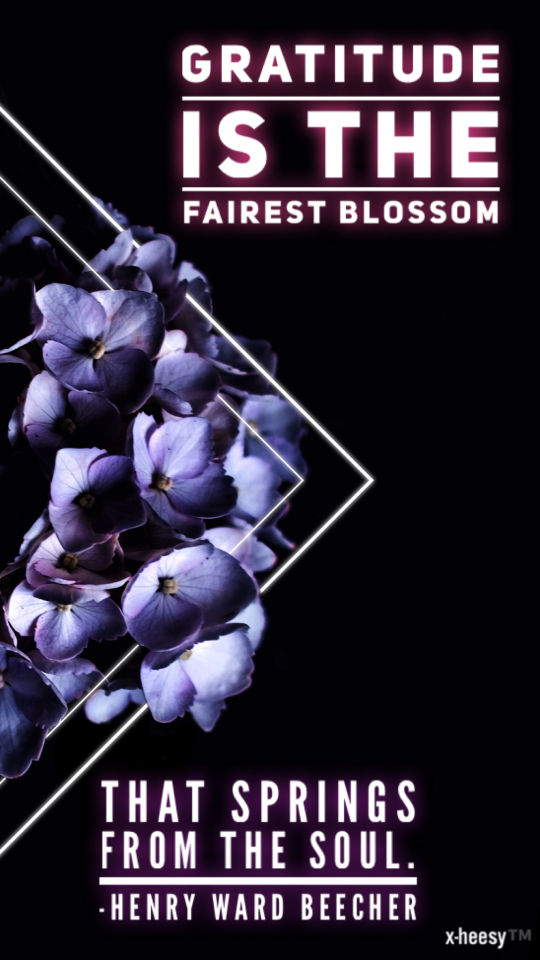

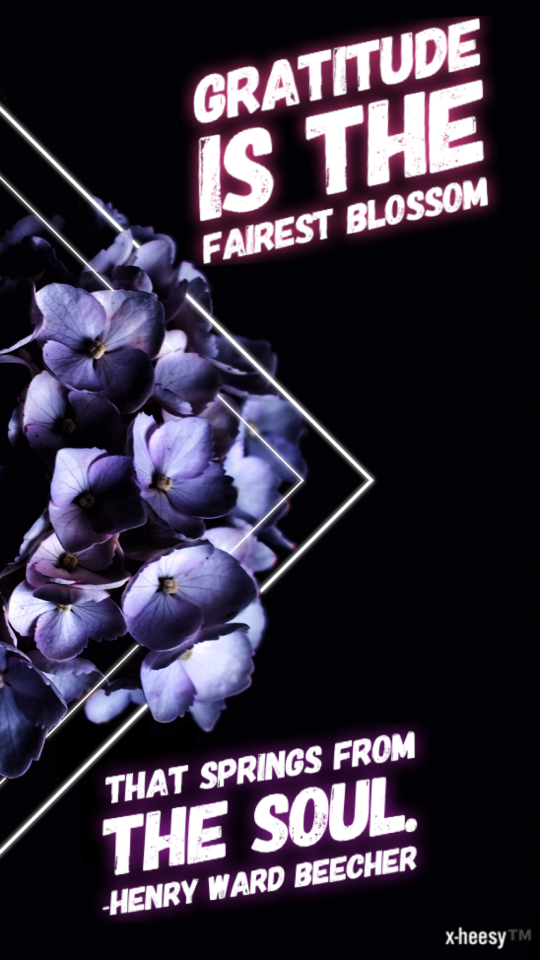




𝙻 𝚘 𝚅 𝚎
Gratitude is the fairest blossom that springs from the soul. -Henry Ward Beecher
Kisses For Roses by Art Department, Aquarius Heaven
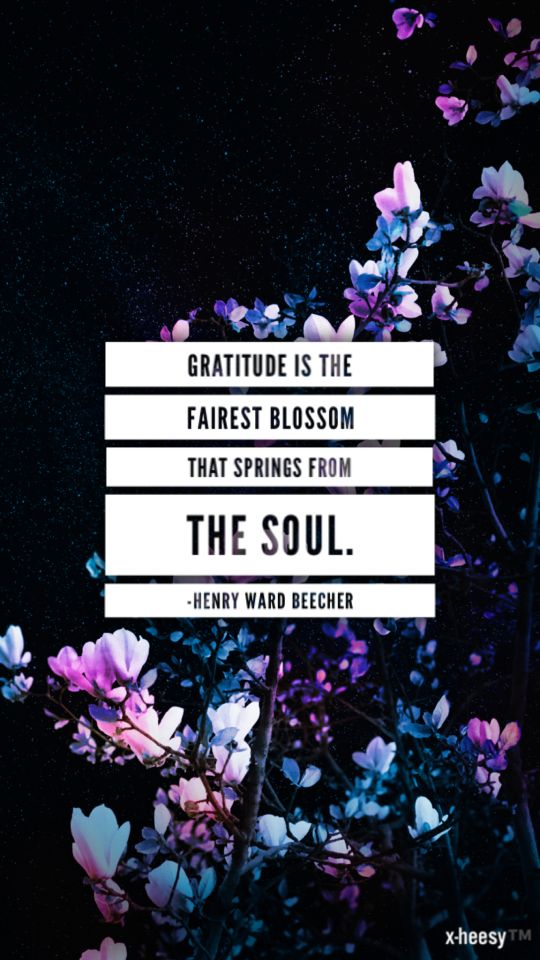
#l o v e#henry ward beecher#x-heesy#my art#artists on tumblr#4/2024#aesthetic#book quotes#quote#quotes#qotd#quoteoftheday#quote inspiration#mental health#depression#anxiety#you are loved#you are not alone#You are the road#knowledge#wisdom#positivity#flower#iphone art#typography#fucking favorite#now playing#music and art#contemporaryart#pop art
3 notes
·
View notes
Text
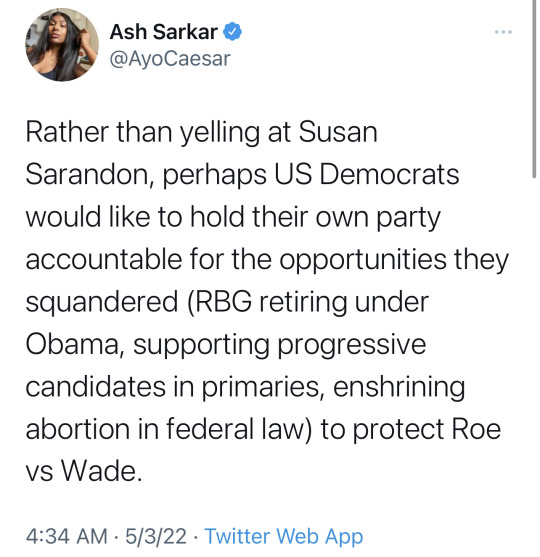




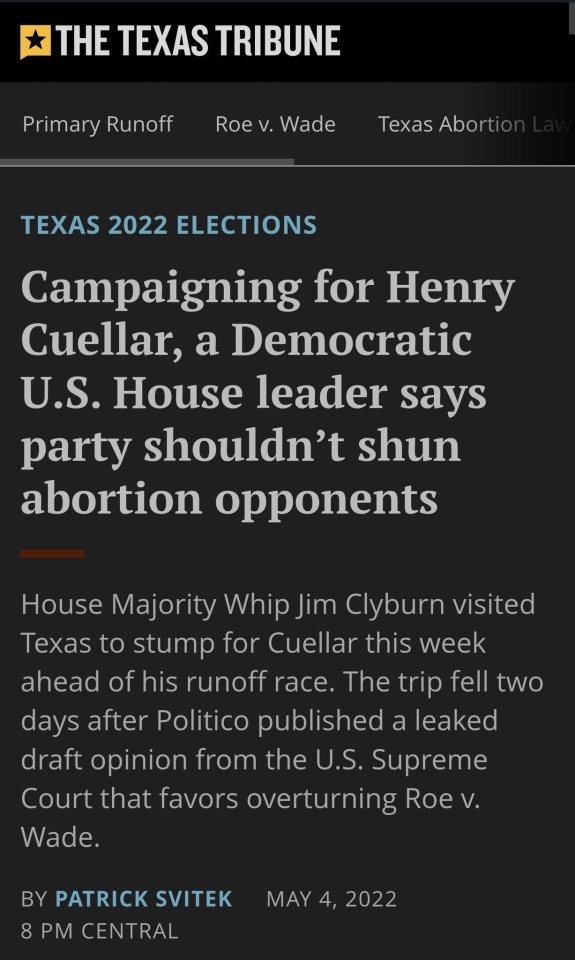


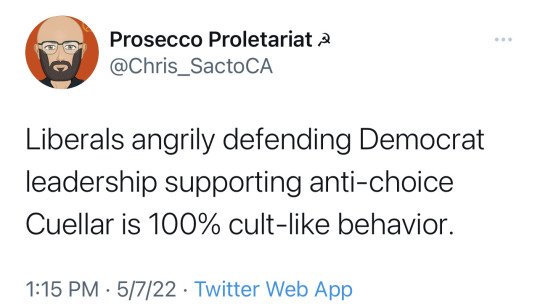
I cannot get over the dissonance of neoliberals going: “WE MUST PROTECT ROE AT ANY COST” and then turning around making up every excuse under the sun for Democrats who either worked with anti-abortionists, supported anti-abortionists, or straight up elected them—but then still blaming Susan Sarandon for Roe getting overturned.
And whenever you try talking to these sycophants, and show them actual receipts of when Biden tried to remove the contraception mandate from Obamacare, or when Bined supported the Hyde amendment until June of 2020, or when he voted to allow states to disregard Roe, or when Biden did literally anything over the past 4 decades that materially weakened the pro-choice movement—these liberal sycophants turn into one of those androids on WestWorld. You’re showing them the receipts, and they just keep repeating:

It’s a fucking cult, man.
They don’t want to protect Roe half as much as they want to protect literally anybody with the letter “D” behind their name. Even when that “Democrat” does NOT support Roe v. Wade.
Like JFC, Idk how to say it any clearer: supporting anti-abortion candidates will result with MORE, not less, anti-abortion legislation. This is how we got here. And no, Democrats are not “playing 3-dimensional chess” by courting and supporting anti-abortion candidates; no, Democrats are not helping the pro-choice movement by “strategically helping” anti-abortion candidates. Jesus.
#politics#blue maga#roe v wade#nancy pelosi#henry cuellar#conservadems#reproductive rights#reproductive justice#healthcare#womens rights#womens health#womanism#feminism#scotus#joe biden
191 notes
·
View notes
Quote
Joan was rewarded with grants and privileges from the Crown, mostly under Henry IV and Henry V although she received licences to hunt in the king’s forests and parks in 1392 and 1395 from Richard II. She may well have enjoyed hunting; Henry V in 1414 granted her the right to hunt in Hatfield Forest. More valuable were grants involving property, such as John Holland’s London house and, temporarily, Hadleigh castle in 1400; the right to live in Rochester castle and to be responsible for its custody in the absence of Sir William Darundell, in 1399; and Leeds castle in Kent in 1414. Not all grants were permanent; in 1401 Joan was to hold the patronage of the hospital of St. Katherine by the Tower of London for as long as there was no queen.
Jennifer C. Ward, "Joan de Bohun, Countess of Hereford, Essex and Northampton, c. 1370-1419: family, land and social networks", Essex Archaeology and History, vol. 32, 2001
#joan fitzalan countess of hereford#henry iv#henry v#richard ii#she does seem to have taken on the roles of a quasi queen#in the court of henry iv (at least until he married joan of navarre)#rebecca holdorph notes she was referred to as the king's mother#though holdorph argues that joan took on roles henry's still-living stepmother - katherine swynford - was uninterested in#whereas it's more likely imo that katherine might have been in poor health (she died in 1403 vs joan who died in 1419)#or considered an inappropriiate or awkward figure for that role because of her scandalous past#and of course joan was the biological grandmother of henry's children and heirs when katherine swynford wasn't
11 notes
·
View notes
Text
Incumbent Rep. Henry Cuellar was already facing a close runoff in Texas’s 28th Congressional District on May 24, but the recent Supreme Court leak has renewed focus on one potential vulnerability: his record on abortion.
Cuellar, a nine-term Congressman and longtime fixture in his South Texas district, is now the last standing House Democrat who has taken anti-abortion stances. Cuellar’s challenger, progressive Jessica Cisneros, has blasted him on the issue, arguing that “he could very much be the deciding vote on the future of our reproductive rights and we cannot afford to take that risk.”
Though Cisneros and her allies are working to ensure abortion rights shape the race, it’s not yet clear to what extent the issue will affect people’s votes. While Democratic strategists say the fight for abortion rights has energized a segment of voters in the region, Cuellar — whose campaign didn’t respond to a request for comment — has said his views are in line with those in the district.
“If his opponent is going to say that we need to kick him out of office because he’s not in favor of abortion, I don’t think that’s going to get very far. I don’t see that being the deciding factor,” says state Rep. Richard Peña Raymond, a Cuellar supporter who also represents part of the district.
Cuellar is one of few congressional Democrats to take a hardline position on abortion. Last year, Cuellar was the only House Democrat to vote against the Women’s Health Protection Act, legislation to codify the protections from Roe v. Wade. Cuellar maintains that his position hasn’t changed, but notes that he opposes an abortion ban without exceptions for rape, incest, and a mother’s health.
The outcome of the race could offer an early indication of how much the issue of abortion rights energizes Democratic voters. In the March primary, Cisneros and Cuellar were within roughly 2 percentage points of one another, with a third candidate, Tannya Benavides, capturing almost 5 percent of the vote.
“My sense is that it is pretty close,” says Matt Angle, a Texas Democratic strategist who’s not affiliated with either campaign. “I thought for a while that Henry was in better shape in the runoff, and he probably still is. But the Supreme Court leak did change the dynamics. It might have excited her base a little bit.”
ABORTION RIGHTS HAVE ENERGIZED SOME VOTERS IN THE DISTRICT
Texas’s 28th Congressional District has been blue for years, though it’s more moderate and socially conservative than the typical district that progressives have gone after. President Joe Biden won the newly drawn version of the district by just 7 points in 2020, compared to, for example, the more than 60 points he won by in the Missouri district where progressive Rep. Cori Bush felled a longtime incumbent that year.
A predominantly Latino district that includes many Catholic voters, the Texas 28th stretches from the more liberal San Antonio region to more moderate voting bases in Laredo and the Rio Grande Valley. Though those demographics may suggest the voters in the district skew anti-abortion, local political experts told Vox that views on abortion rights in the area match up to those in the state overall. According to an April 2022 University of Texas poll, Texas voters are split on the subject, with a plurality who identify as pro-abortion.
“They assume because it’s South Texas and it’s Catholic that it’s a pro-life district. Texas mirrors the national opinions, and even places like Laredo are pro-choice,” says George Shipley, a longtime Democratic consultant in Texas who’s not affiliated with either campaign.
Organizers and Democrats on the ground say they’ve seen the leaked Supreme Court decision energize many voters including young people and women. “I’m Catholic, and yes I’m anti-abortion, but I’m for a woman’s right to choose. I know what just happened has sparked a real response that we didn’t see in 2020,” says Sylvia Bruni, the chair of Webb County Democrats, who’s not affiliated with or backing either candidate.
Still, it’s an open question whether this outrage translates to the polls. Older, more conservative voters are among those more likely to back Cuellar, and historically more likely to show up for a runoff election. “There’s a lot of old-school folks. And as you know, in runoffs, old-school folks vote,” says Susan Korbel, a member of the Bexar County Blue Action Democrats and candidate for a Bexar County commissioner seat, who’s not backing either candidate.
And as is the case in districts across the country, few if any TX-28 residents are single-issue voters. Observers note that voters are weighing a number of issues, including wages and jobs, in addition to abortion rights.
THE OUTCOME COULD SAY A LOT ABOUT THE PARTY’S FUTURE
The results in this race could send a strong message about the strength of the progressive wing of the party, and the degree to which abortion rights are a motivating issue for many voters.
“If she wins, it’s going to send a message to every Democrat that thinks they can equivocate on choice, that they can equivocate on women’s health, that they won’t be able to do that,” says Cristina Tzintzún Ramirez, the president of NextGen America and founder of a statewide group dedicated to mobilizing Latino voters in Texas.
Outside organizations like Planned Parenthood Action Fund and Naral are also working to send that message. They’ve mobilized heavily in the wake of the leak, with Naral sending four organizers to the district and launching a new digital ad. Cisneros, meanwhile, has called for House leaders like Speaker Nancy Pelosi and Majority Leader Steny Hoyer, who back Cuellar, to withdraw their support over his anti-abortion stance. They’ve argued, though, that they welcome a diverse range of viewpoints in the Democratic caucus.
Progressives have eyed this district as a key target since 2020, when Cisneros came within 4 percentage points of Cuellar in the primary. In addition to abortion rights, Cisneros has sought to draw contrasts with Cuellar on issues like immigration, climate change, and corporate donations.
A Cuellar loss would be significant given how entrenched he is as an 18-year incumbent in the region and an even longer one in the state. Prior to serving in the House, he was a Texas Secretary of State and a state representative, and he has touted his leadership role in Congress as an important advantage for the district.
If her challenge is successful, Cisneros would have to keep the momentum going into the fall. Because the district is a moderate one, experts believe a progressive candidate is likely to have a tougher fight in a general election as Republicans try to cast them as too extreme. “I think the district is Democratic enough that Jessica can win, but I don’t think they should take it for granted,” says Angle.
Cisneros has emphasized that she’s focused on district outreach in her campaign, amid concerns that the region is shifting toward the right. “This area has been reliably Democratic for a very long time,” she previously told Vox. “But that’s also led a lot of incumbents to just take this community for granted. We’re offering an alternative vision of what South Texas can look like.”
#us politics#news#vox#Rep. Henry Cuellar#Jessica Cisneros#pro life#abortions#abortion bans#texas#tx#2022 elections#2022 midterms#2022#pro choice#Rep. Richard Peña Raymond#Women’s Health Protection Act#roe v. wade#reproductive health#reproductive rights#democrats#progressives
13 notes
·
View notes
Text
Reading list for Afro-Herbalism:
A Healing Grove: African Tree Remedies and Rituals for the Body and Spirit by Stephanie Rose Bird
Affrilachia: Poems by Frank X Walker
African American Medicine in Washington, D.C.: Healing the Capital During the Civil War Era by Heather Butts
African American Midwifery in the South: Dialogues of Birth, Race, and Memory by Gertrude Jacinta Fraser
African American Slave Medicine: Herbal and Non-Herbal Treatments by Herbert Covey
African Ethnobotany in the Americas edited by Robert Voeks and John Rashford
Africanisms in the Gullah Dialect by Lorenzo Dow Turner
Africans and Native Americans: The Language of Race and the Evolution of Red-Black Peoples by Jack Forbes
African Medicine: A Complete Guide to Yoruba Healing Science and African Herbal Remedies by Dr. Tariq M. Sawandi, PhD
Afro-Vegan: Farm-Fresh, African, Caribbean, and Southern Flavors Remixed by Bryant Terry
Barracoon: The Story of the Last “Black Cargo” by Zora Neale Hurston
Big Mama’s Back in the Kitchen by Charlene Johnson
Big Mama’s Old Black Pot by Ethel Dixon
Black Belief: Folk Beliefs of Blacks in America and West Africa by Henry H. Mitchell
Black Diamonds, Vol. 1 No. 1 and Vol. 1 Nos. 2–3 edited by Edward J. Cabbell
Black Faces, White Spaces: Reimagining the Relationship of African Americans to the Great Outdoors by Carolyn Finney
Black Food Geographies: Race, Self-Reliance, and Food Access in Washington, D.C. by Ashanté M. Reese
Black Indian Slave Narratives edited by Patrick Minges
Black Magic: Religion and the African American Conjuring Tradition by Yvonne P. Chireau
Black Nature: Four Centuries of African American Nature Poetry edited by Camille T. Dungy
Blacks in Appalachia edited by William Turner and Edward J. Cabbell
Caribbean Vegan: Meat-Free, Egg-Free, Dairy-Free Authentic Island Cuisine for Every Occasion by Taymer Mason
Dreams of Africa in Alabama: The Slave Ship Clotilda and the Story of the Last Africans Brought to America by Sylviane Diouf
Faith, Health, and Healing in African American Life by Emilie Townes and Stephanie Y. Mitchem
Farming While Black: Soul Fire Farm’s Practical Guide to Liberation on the Land by Leah Penniman
Folk Wisdom and Mother Wit: John Lee – An African American Herbal Healer by John Lee and Arvilla Payne-Jackson
Four Seasons of Mojo: An Herbal Guide to Natural Living by Stephanie Rose Bird
Freedom Farmers: Agricultural Resistance and the Black Freedom Movement by Monica White
Fruits of the Harvest: Recipes to Celebrate Kwanzaa and Other Holidays by Eric Copage
George Washington Carver by Tonya Bolden
George Washington Carver: In His Own Words edited by Gary Kremer
God, Dr. Buzzard, and the Bolito Man: A Saltwater Geechee Talks About Life on Sapelo Island, Georgia by Cornelia Bailey
Gone Home: Race and Roots through Appalachia by Karida Brown
Ethno-Botany of the Black Americans by William Ed Grime
Gullah Cuisine: By Land and by Sea by Charlotte Jenkins and William Baldwin
Gullah Culture in America by Emory Shaw Campbell and Wilbur Cross
Gullah/Geechee: Africa’s Seeds in the Winds of the Diaspora-St. Helena’s Serenity by Queen Quet Marquetta Goodwine
High on the Hog: A Culinary Journey from Africa to America by Jessica Harris and Maya Angelou
Homecoming: The Story of African-American Farmers by Charlene Gilbert
Hoodoo Medicine: Gullah Herbal Remedies by Faith Mitchell
Jambalaya: The Natural Woman’s Book of Personal Charms and Practical Rituals by Luisah Teish
Just Medicine: A Cure for Racial Inequality in American Health Care by Dayna Bowen Matthew
Leaves of Green: A Handbook of Herbal Remedies by Maude E. Scott
Like a Weaving: References and Resources on Black Appalachians by Edward J. Cabbell
Listen to Me Good: The Story of an Alabama Midwife by Margaret Charles Smith and Linda Janet Holmes
Making Gullah: A History of Sapelo Islanders, Race, and the American Imagination by Melissa Cooper
Mandy’s Favorite Louisiana Recipes by Natalie V. Scott
Medical Apartheid: The Dark History of Medical Experimentation on Black Americans from Colonial Times to the Present by Harriet Washington
Mojo Workin’: The Old African American Hoodoo System by Katrina Hazzard-Donald
Motherwit: An Alabama Midwife’s Story by Onnie Lee Logan as told to Katherine Clark
My Bag Was Always Packed: The Life and Times of a Virginia Midwife by Claudine Curry Smith and Mildred Hopkins Baker Roberson
My Face Is Black Is True: Callie House and the Struggle for Ex-Slave Reparations by Mary Frances Berry
My Grandmother's Hands: Racialized Trauma and the Pathway to Mending Our Hearts and Bodies by Resmaa Menakem
On Her Own Ground: The Life and Times of Madam C.J. Walker by A'Lelia Bundles
Papa Jim’s Herbal Magic Workbook by Papa Jim
Places for the Spirit: Traditional African American Gardens by Vaughn Sills (Photographer), Hilton Als (Foreword), Lowry Pei (Introduction)
Post Traumatic Slave Syndrome by Dr. Joy DeGruy
Rooted in the Earth: Reclaiming the African American Environmental Heritage by Diane Glave
Rufus Estes’ Good Things to Eat: The First Cookbook by an African-American Chef by Rufus Estes
Secret Doctors: Ethnomedicine of African Americans by Wonda Fontenot
Sex, Sickness, and Slavery: Illness in the Antebellum South by Marli Weiner with Mayzie Hough
Slavery’s Exiles: The Story of the American Maroons by Sylviane Diouf
Soul Food: The Surprising Story of an American Cuisine, One Plate at a Time by Adrian Miller
Spirituality and the Black Helping Tradition in Social Work by Elmer P. Martin Jr. and Joanne Mitchell Martin
Sticks, Stones, Roots & Bones: Hoodoo, Mojo & Conjuring with Herbs by Stephanie Rose Bird
The African-American Heritage Cookbook: Traditional Recipes and Fond Remembrances from Alabama’s Renowned Tuskegee Institute by Carolyn Quick Tillery
The Black Family Reunion Cookbook (Recipes and Food Memories from the National Council of Negro Women) edited by Libby Clark
The Conjure Woman and Other Conjure Tales by Charles Chesnutt
The Home Place: Memoirs of a Colored Man’s Love Affair with Nature by J. Drew Lanham
The Jemima Code: Two Centuries of African American Cookbooks by Toni Tipton-Martin
The President’s Kitchen Cabinet: The Story of the African Americans Who Have Fed Our First Families, from the Washingtons to the Obamas by Adrian Miller
The Taste of Country Cooking: The 30th Anniversary Edition of a Great Classic Southern Cookbook by Edna Lewis
The Tuskegee Syphilis Study: An Insiders’ Account of the Shocking Medical Experiment Conducted by Government Doctors Against African American Men by Fred D. Gray
Trace: Memory, History, Race, and the American Landscape by Lauret E. Savoy
Vegan Soul Kitchen: Fresh, Healthy, and Creative African-American Cuisine by Bryant Terry
Vibration Cooking: Or, The Travel Notes of a Geechee Girl by Vertamae Smart-Grosvenor
Voodoo and Hoodoo: The Craft as Revealed by Traditional Practitioners by Jim Haskins
When Roots Die: Endangered Traditions on the Sea Islands by Patricia Jones-Jackson
Working Conjure: A Guide to Hoodoo Folk Magic by Hoodoo Sen Moise
Working the Roots: Over 400 Years of Traditional African American Healing by Michelle Lee
Wurkn Dem Rootz: Ancestral Hoodoo by Medicine Man
Zora Neale Hurston: Folklore, Memoirs, and Other Writings: Mules and Men, Tell My Horse, Dust Tracks on a Road, Selected Articles by Zora Neale Hurston
The Ways of Herbalism in the African World with Olatokunboh Obasi MSc, RH (webinar via The American Herbalists Guild)
1K notes
·
View notes
Text
Volume III Chapter IV/V of the original 1818 text of Frankenstein lives in my brain rent free. I need to rant about Clerval’s death or I’ll loose it. (It’s late and I’m exhausted rn so my ass is NOT as coherent and structured as it could be but fuck it we ball)
“He appeared to be a handsome young man, about five and twenty years of age.” MY PRECIOUS BOY
“(…) having brought the body into her house; it was not cold. They put it into a bed, and rubbed it; and Daniel went to the town for an apothecary, but life was quite gone.” HE MIGHTN’T HAVE BEEN DEAD WHEN THEY FOUND HIM BUT IT WAS TOO LATE
“I saw the lifeless form of Henry Clerval stretched before me. I gasped for breath; and, throwing myself on the body, I exclaimed, “Have my murderous machinations deprived you also, my dearest Henry, of life? Two I have already destroyed; other victims await their destiny: but you, Clerval, my friend, my benefactor”——
The human frame could no longer support the agonizing suffering that I endured, and I was carried out of the room in strong convulsions.
A fever succeeded to this. I lay for two months on the point of death (…)” THE WAY VICTOR REACTS TO AND SPIRALS FROM CLERVAL’S DEATH IS SO MUCH MORE SEVERE THAN ANYTHING ELSE THAT HAPPENS TO HIM and it’s also an extremely interesting character study to see what happens when the only person he ever really seemed to have a mutual loving and healthy relationship with gets cut out of the picture – Victor’s had his fevers, he’s wallowed, but he always had Clerval to draw him from his wallowing and to nurse him back to health. So what happens when Clerval’s death is the cause of that anguish? THE DRAMA THE ANGST I love these silly little gothic losers to death but watching Frankenstein grieve over the passing of who was pretty much essentially his lover is fascinating to me and it SHOWS how much Frankenstein adores Clerval through the latter’s death. THE MAGNITUDE OF HIS GRIEF IS A TESTAMENT TO THEIR LOVE oml i can’t rn frfr THEYRE SO GAY AND SO GOTHIC I CAN NOT
“Why did I not die? More miserable than man ever was before, why did I not sink into forgetfulness and rest?” “I thank you; but all that you mention is nothing to me: on the whole earth there is no comfort which I am capable of receiving.” “(…)surely I should have died on the coffin of Henry.” AGAIN Victor’s absolute grief tearing himself up over it
“As my sickness quitted me, I was absorbed by a gloomy and black melancholy, that nothing could dissipate. The image of Clerval was for ever before me, ghastly and murdered.” “Sometimes they were the expressive eyes of Henry, languishing in death, the dark orbs nearly covered by the lids, and the long black lashes that fringed them.” Again what I said about his grief being a testament to their love bro, REMINISCING ABOUT HIS DEAD LOVER AND HIS BEAUTY EVEN IN DEATH WHILE GRIEVING HIM I CANT BRO
“Ah! my father, do not remain in this wretched country; take me where I may forget myself, my existence, and all the world.” HERE’S THE START OF HIM PUSHING AWAY THE MEMORY AND TRYING TO SUPPRESS IT BECAUSE THE GRIEF IS TOO SEVERE and that is SO interesting for how he shifts his tone with Elizabeth and puts up that fake demeanour of wanting to marry her because he thinks it’ll make HER happy even though both of them describe dreading the wedding, also possibly another argument for the legitimacy of reading Clerval and Frankenstein’s relationship as romantic – in order to forget him, he assigns himself to the role given to him as a child by marrying Elizabeth and gives up whatever he hope he had (possibly discouraged from Clerval being murdered as a response to Victor refusing to finish the Bride and subject her to the same fate as him and Elizabeth to the Creature, a pact made without her knowledge or consent, an arranged marriage. Where has spiting that tradition led him? Where has him standing up to the shroud of his mother’s dying wishes, hanging over him the entire novel thus far, led him, by refusing to force the Bride into an arranged marriage with the Creature, as he was with Elizabeth? To the death of the one man he truly loved. So fuck it, right? He can at least “make his dear cousin happy” and not die spiting the one thing he was meant to do – make his mother proud from beyond the grave by marrying Elizabeth.)
“the wind that blew me from the detested shore of Ireland(…)” sorry my country traumatised you bro (I mentioned to one of my teachers while explaining the plot of Frankenstein to them, as you do, that this chapter takes place in Ireland and the “god damn ok” face was priceless)
“I was deceived by no vision, and that Clerval, my friend and dearest companion, had fallen a victim to me and the monster of my creation. I repassed, in my memory, my whole life; my quiet happiness while residing with my family in Geneva, the death of my mother, and my departure for Ingolstadt. I remembered shuddering at the mad enthusiasm that hurried me on to the creation of my hideous enemy, and I called to mind the night during which he first lived. I was unable to pursue the train of thought; a thousand feelings pressed upon me, and I wept bitterly.” HE’S TRYING SO DESPERATELY TO LEAVE IT BEHIND AND TO REPRESS IT but now he’s left Ireland and he’s no longer feverish, the clarity washes over him and he can’t do anything except just lie there and cry over everything that’s happened AND MY POOR LAD HE CANT EVEN CONTINUE BEYOND THE POINT OF THE CREATURES REANIMATION BECAUSE THOSE FEELINGS PRESS DOWN ON HIM AND CROWD HIM AND OVERWHELM HIM AND HE JUST BREAKS INTO SOBS
And what happens after “the night during which he first lived”?
He’s saved from his own downward spiral by Clerval.
What’s he doing now?
Going on a downward spiral.
Where’s Clerval?
Dead.
“Ever since my recovery from the fever I had been in the custom of taking every night a small quantity of laudanum; for it was by means of this drug only that I was enabled to gain the rest necessary for the preservation of life. Oppressed by the recollection of my various misfortunes, I now took a double dose, and soon slept profoundly. But sleep did not afford me respite from thought and misery; my dreams presented a thousand objects that scared me.” And Christ above THIS LINE, not only can he now physically not sleep at night after what happened, but he’s gotten into the habit of drug use over it – which wouldn’t have been too bizarre by Victorian standards, but in the 18th century, laudanum wasn’t administered nearly as liberally and was mostly used for surgery, from what I can find, anyway. Not to mention that fact that he starts double dosing on it as the memories come back to him – his grief starts getting to the point where he’s using drug use in order to cope, but it hardly matters as his torment follows him to sleep.
“We had resolved not to go to London, but to cross the country to Portsmouth, and thence to embark for Havre. I preferred this plan principally because I dreaded to see again those places in which I had enjoyed a few moments of tranquillity with my beloved Clerval. I thought with horror of seeing again those persons whom we had been accustomed to visit together, and who might make inquiries concerning an event, the very remembrance of which made me again feel the pang I endured when I gazed on his lifeless form in the inn at ——.” THIS LINE LIVES IN MY BRAIN. RENT FREE. HOW COULD SHELLEY HAVE CUT THIS OUT OF THE 1831 PUBLICATION THIS IS SO GOLDEN DEAR LORD I ADORE THEM.
“MY BELOVED CLERVAL”
BUT ALSO AGAIN we’ve got Frankenstein trying SO desperately to forget everything, and he knows that he can’t face the people who knew Clerval or he’d break down. And I love the way this version continues on his grief to the next chapter – it’s not done and dropped, its ongoing and it plagues him, and it will plague him as long as he lives. I wonder what would happen if he did go through London, if he did meet those people again. Would things have turned out differently? Would he finally have been given a sense of comfort and clarity through mutual grief, as nobody so far since Henry’s death and for the rest of the book, except the creature, ironically, has grieved for Clerval except for Frankenstein. If he met people who took as fondly to Clerval as he did, at least on meeting him briefly, who would have sympathy towards Victor – would he finally have that space to grieve for him in a healthy way, to be comforted by people who at least vaguely understand a fraction of his anguish?
The way Victor Frankenstein BREAKS after the death of Henry Clerval is one of the most fascinating and endearing parts of the novel that completely lives in my head rent free. He spirals, he becomes ill, he becomes deeply suicidal and depressed, he begins drug misuse – and adaptations have the sheer balls to cut Clerval out of the story altogether.
…..”My beloved Clerval” HELP ME HE ACTUALLY SAID IT I LOVE THEM SO MUCH
#gothic lit#classic literature#gothic literature#frankenstein#goth lit#classic lit#frankenstein weekly#clervalstein#Victor Frankenstein#Henry Clerval#frankenstein or the modern prometheus#frankenstein 1818
117 notes
·
View notes
Text
storylines rwrb movie didn't include that you get if you read the book:
(ok I loved the movie the cute romcom it is is ADORABLE but if you're interested in the characters and storyline then boy do I have a treat for you!) NO BOOK SPOILERS AHEAD
- Claremont v Richards is such a well done, realistic political race oh my god it hangs over the whole book it's immaculate
- leaked emails is like a whole fuckin plot point that gets built up to
- Bea is recovering from a major health issue...
- Alex has a sister her name is June and she's a DELIGHT
- there's a whole poly-ish relationship with Nora, June, and Pez
- Liam, Alex's friend from high school
- Alex, not realizing he's bi until it's blindingly obvious to everyone else
- the fuckery that gets Alex on a plane to London after the emails were leaked
- Luna, a gay hispanic senator who is like the center of politics for 2/3 of the book
- Alex overworking himself on the campaign to try not to love Henry
- disagreements between Ellen and Oscar
- Catherine, Bea and Henry's mum
- a shit ton of nuance into Henry's feelings on the UK's queer history and Alex's finding his queer identity
- Henry goes to therapy! his dad dying is like a major part of his life and it's really beautifully handled
- Amy's life! her wife!
- Cash, another secret service agent
- really detailed morning in Paris! they're adorable what can I tell you
#rwrb movie#red white and royal blue#alex claremont diaz#prince henry rwrb#prince henry fox mountchristen windsor#bea rwrb#pez rwrb#nora rwrb#june rwrb#ellen claremont rwrb#oscar diaz rwrb#zahra rwrb#shaan rwrb#amy rwrb#cash rwrb#liam rwrb#luna rwrb#rwrb book#firstprince
132 notes
·
View notes
Text
That his health may not have been as robust as has been assumed might be inferred from the substantial and recurrent entries for purchase of medicaments in his household accounts as prince. As king, he often appears to have consulted university-trained physicians, and the names of Masters Peter de Altobasse, John of Coventry, Jean Tiphaine, Gilbert Kymer and Jacopo of Milan recur through the household accounts. During his last illness, his need for skilled medical attention was indicated by the summons, on the king’s express order, of Master John Swanwych, MA, Bachelor in Physic, from England to France, to ‘do him service’. Henry’s physicians, given the fever from which he was suffering, had apparently been afraid to give him medicines to be taken internally, and he seems to have taken action on his own initiative. Swanwych was, on 14 July 1422, paid 100s. ‘which the … king, with the assent of his council, ordered to be paid to the same master, to have as his gift for his expenses in coming [to him] for the aforesaid reason’. The regular provision at this time of portable urinals, housed within the king’s ‘privy seat’ (privata cathedra), transported in leather cases, might suggest a response to urgent medical needs. And the ‘chronic intestinal condition’ from which he was to die had certainly manifested its severe symptoms by mid-June 1422, when he became too ill to ride. An earlier testimony of Richard Courtenay, bishop of Norwich, a close intimate of the king, to the astrologer Jean Fusoris, in 1415, is noteworthy in this respect. Courtenay was apparently concerned for Henry’s state of health and requested Fusoris to draw up the king’s horoscope, or birth chart, thereby offering some prognosis.
Malcolm Vale, Henry V: The Conscience of a King (Yale University Press, 2016)
#henry v#the death of henry v#henry v's health#richard courtenay bishop of norwich#jean fusoris#historian: malcolm vale
2 notes
·
View notes
Text
RWRB Movie Analysis: Henry's Seclusion and Perception-Part 2
A little follow-up of this post after I realized something while watching Henry flinch after Alex tried to hold his hand during their Paris date.
This is more up to interpretation but in the same way Henry was isolated in a space without any sort of moral support during the week after the email leaks while Alex wasn’t, I think the same could be possibly said with their view on public displays of affection.
I’m gonna preface by saying that even in the RWRB Movie verse, both UK and USA are evidently mostly LGBT+ friendly. Alex’s US kind of goes without saying, while for Henry, given the sheer amount of people that ended up coming to support him all across the country, I think the same could be said for his UK.
So given that their big environment is LGBT friendly, the difference here is their own circles.
Before President Claremont was elected, Alex was just like any of us, as he put it himself, “an anonymous working class kid”. His socializing circle wasn’t really limited. On top of that both of his parents are democrats. Even before he figured out his own bisexuality, he was definitely exposed to LGBT communities and individuals, colourful queer people who showed off their gender, sexuality and relationship/partner proudly. Besides, from his interaction with Nora, his mom, even Henry during the NYE party, Alex is clearly a physically affectionate person to begin with. He is used to displays of affection, and has see queer public displays of affection.
So when he starts to fall for Henry (which I firmly believed started properly since the state dinner), he doesn’t really register displays of affection as something to be hidden despite now being in a homosexual relationship. This aspect is not that different in his mind. The only times we see Alex really make an effort to conceal it is when they want to… do dirty things, like the polo match (Matthew/Prime release the full scene please) and the DNC hotel visit, which in any case is something that one would make effort to hide even for a bit.
Look at the movie again. Alex reaches out to hold Henry’s hand in Paris, Henry flinches. Alex steps forward to kiss Henry at the airstrip after the night in the V&A, Henry stops him, even if it’s private airstrip with only Henry’s staff. The one sentence Alex said that sent Henry spiralling and trying to break things off was “We could walk through Austin holding hands, and it won’t even matter if anyone sees us.” (which is one of my favourite lines in the book by the way, granted used in a different situation) Alex finds public displays of affection towards Henry very natural.
Henry doesn’t.
However much he loves touching and kissing Alex in private behind closed door throughout the entirety of their relationship, he was never comfortable, or confident for them in public settings, even if there’s actually no one except their own professional secret service/ personal staff there.
And I think one of the contributing reasons is unlike Alex, he never really got to see queer people be openly proud of their identity and partners.
Henry, as the prince, has his social circle and travels limited. You’re not gonna see him on the subway or walking through Trafalgar Square. He’s not gonna be able to walk the streets and just see queer citizens out and about the way Alex did. Given the context clues in the movie, I’m guessing he’s limited to causes the crown wants to serve (veterans, climate, diplomacy, which all have their own values as social issues but doesn’t suit Henry) and unlike the royals in our world (yes I pay some attention to the irl royal family) he couldn’t even choose topics that interest him, that he wants to serve, like arts, LGBT, and mental health (there’s a sequel idea!!! Henry getting to choose how to use his title for causes he’s part of and care about), plus it’s clear his family, the king at least, had no interest in getting involved with LGBT issues, so he didn’t have any chance to approach the community while on duty either. Considering his grandfather warned him against pursuing relationships when he was 18, he probably was forced into some sense of shame or fear regarding any possibility of having a public relationship, which was also part of his argument during the Kensington confrontation. Seeing as Nick and Matthew decided Paris was Henry’s first time with someone he actually had feelings for, I’m guessing past hookups in said “English Boarding School” were done out of sexual frustration and some degree of rebellion, but even then it was more on the sexual side instead of anything truly affectionate, and that was still extremely secretive with stacks of NDAs.
So on Henry’s part, he was secluded in a almost forcefully heteronormative environment, never really got to see people like him in real life, in front of his eyes (reading queer history and news about LGBT rights is very different from seeing it yourself), and was told that this was something to be ashamed about, something he can’t do, something impossible. That’s why he never felt confident enough to ask for touch or touch Alex in anywhere remotely public. (He was drunk at the karaoke, and I think most of the Texas vacation was on the Claremont-Diaz’s private property, so those don’t count)
Until the palace pride protest, where thousand of people like him came to storm the palace with their rainbow flags and banners, their support, and their own identities display.
Faces with this massive display of queer pride right in front of him, Henry, maybe for the first time, sees so many people like them, and he sees that it’s okay for him to be gay, that there is nothing selfish, shameful, repulsive or unacceptable about who he is and who he loves. They’re here for him. They’re just like him. They’re proud of it. They show it.
So this time, in front of his family, a window away from the outside world, it’s his turn to ask for Alex’s hand, held between his. He’s finally confident enough in everything so tell Alex, through a wet smile, “I love you.”
Both of them look out, at the sea of colourful love and pride. Alex, who has seen this many times before in his life, but probably the first time he sees this knowing he’s part of that sea. Henry, who gets to see the crowd be proud of something he’s tried so long to conceal and hide.
Henry can be proud of his sexuality too.
And he shows it, on the balcony of Buckingham Palace, with thousands of people cheering for him and his boyfriend.
#rwrb#red white and royal blue#rwrb movie#alex claremont diaz#henry fox mountchristen windsor#henry hanover stuart fox#firstprince#nicholas galitzine#taylor zakhar perez#rwrb thoughts#rwrb movie analysis#rwrb meta#meta#in all honesty this is more context clues than concrete evidence#but imo it still stands#will write something about Alex's physical affection
66 notes
·
View notes
Note
RE: Alastor v. Edison
If Alastor has it out for Edison, do you think he's got side beef with Henry Ford -- the man who hated Jazz SO MUCH that he funded efforts that resulted in US public schools taught line / square dancing for decades in the name of health (white heritage).
Especially since Alastor is of an age and from an area where he is probably familiar with line / square dancing AND Jazz is from his hometown, they practically grew up together.
I don't know, I just like the idea of Alastor occasionally stomping through Hell looking for Edison (and maybe Ford) because "I know you're down here, you putain, you weren't THAT good!"
I love you, random citizen, for pointing this out this historical fact. 😂
31 notes
·
View notes
Text
A Tragedy, Indeed
Based on a prompt from @nburkhardt, thank you for the idea and I hope it meets your expectations. Please leave your thoughts in the comments!
~*~*~*~
There hadn’t been many tragedies in the Harrington family. All of Steve’s grandparents were still alive, his parents were healthy albeit absent, and besides the migraines and tinnitus, Steve was healthy. The only tragedy they had was Aunt Janine’s fondness for cocaine and even that was kept under lock and key to avoid a scandal. Overall, the entire Harrington family was fortunate. Until that unlucky week in March of 1986.
Steve wasn’t close to the extended Harrington family anymore, he hadn’t been since his younger years when his parents would drag him to holiday functions. He was close with his cousins back then but just like everything else, they were torn apart by their shitty families. Steve hadn’t spoken to his cousin in years and he really only ever saw her around school or at family dinners. They had a lot in common but it was never quite enough to become friends. They each had harsh parents with too high of expectations, a popular status resting on a fragile facade, and mental health that could always be better.
Still, when he heard Eddie describing what had happened to Chrissy, Steve felt his blood turn to ice. To imagine his sweet cousin suffering with nightmares and hallucinations for weeks on end. To picture her turning to the school drug dealer in her last hope to escape the madness. To imagine her brain melting, her eyes torn through her skull, and her bones snapping painfully… It was heartbreaking.
Steve couldn’t reconcile the image of his sweet and innocent cousin, his favorite family member by far, suffering like Eddie said she did. When he imagined Chrissy, he pictured her beaming smile and bright eyes shining with mischief when they stole all of the cookies at the Christmas dinner all those years ago when times were good and things still seemed simple. He thought of her cheerful giggles when she was practicing a particularly complex routine at cheer practice or her knowing glances over to him in the gym when he tried to suavely flirt with Nancy.
She didn’t deserve to have vivid nightmares that followed her into wakefulness, not like Steve did. Chrissy hadn’t been involved at all with the Upside Down so why was she targeted as a victim? Unlike Steve, she hadn’t seen the worst of what the world had to offer.
No, she didn’t deserve the nightmares that Steve had every night or the horrific headaches he had everyday. She didn’t deserve to experience nosebleeds like Steve did, she hadn’t suffered any amount of head trauma. Most of all though, Chrissy didn’t deserve to die in the most excruciating and terrible way that anyone could ever imagine. Not like Steve did.
When the time came, Steve fell into the waking nightmare willingly with his thoughts on Chrissy. Good god, he hoped this isn’t what she experienced. He could feel the ice cold fear in his veins and the paralyzing terror overtaking his body. He came face to face with the Melted Man, Vecna/Henry/One, and heard him mocking him relentlessly, poking fun at his numerous faults. Steve could feel the pain of his bones snapping and could only hope that Chrissy had been too far gone when it came time for her bones to break. He could hear his friends frantically singing and trying to load tapes, trying to guess what his favorite song would be in order to save him. His hope of survival dwindled though, they would never guess what it was. They kept trying to save him, to get him to fall from his levitation and survive.
It would all be for naught, however. Just like his cousin, Steve’s brain melted and the long bones of his limbs snapped like toothpicks. His senses faded away and his body lost all that made it Steve. Just like Chrissy, when his broken body was finally released from the curse, it was just that. His body. Steve was dead and he wasn’t coming back.
With that, Steve was the fourth victim of Vecna and another Harrington tragedy occurred. Yet another Harrington was claimed by the curse of Vecna.
My Permanent Tag List: @doubleb11 @nburkhardt @zerokrox-blog @newtstabber @i-less-than-three-you @straight4joekeery @carlyv @pyrohonk @ksherlock15 @conversesweetheart @estrellami-1 @suddenlyinlove @yikes-a-bee @swimmingbirdrunningrock @perseus-notjackson @anaibis @merricatty @maya-custodios-dionach @grtwdsmwhr @manda-panda-monium @lumoschildextra @goodolefashionedloverboi @mentallyundone @awkwardgravity1 @anzelsilver @devondespresso @gregre369 @mysticcrownshipper @disasterlia @lillys-weird-world @messrs-weasley @pnk-lemonades @orangesunsets12 @awkotaco24 @pukner
@strangerthingfanfic @dangdirtydemons @bookworm0690 @hannahhook7744 @dreamlandforever @marsbars97 @precursorandthedragon @romanticdestruction @5ammi90 @death-thee-nervousqueer @panicatthediaz @justforthedead89 @futuristicnachostranger @breadboi66
#feeling angsty today so here we go#on a mission to make @pyrohonk cry again#stranger things#fanfic#steve harrington#eddie munson#chrissy cunningham
108 notes
·
View notes
Text
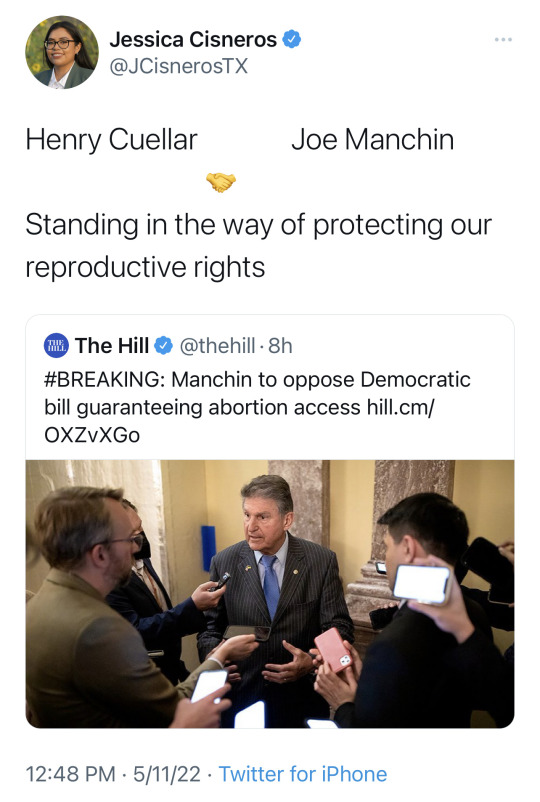
Least shocking news ever.
#politics#joe manchin#nancy pelosi#jessica cisneros#henry cuellar#abortion#texas#reproductive rights#reproductive justice#healthcare#womens health#womens rights#roe v wade#womanism#feminism
49 notes
·
View notes
Text




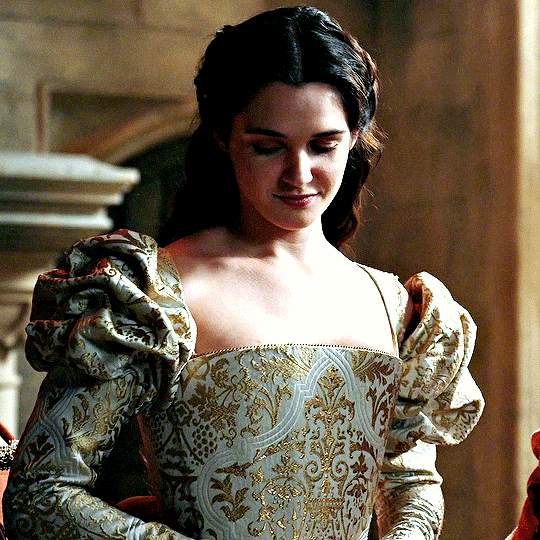
From Princess, to Queen, to Duchess
Mary Tudor (March, c. 1496; London, England - June, 1533; Suffolk, England) was an English princess, the third wife of King Louis XII of France and one of the two sisters of King Henry VIII. Mary was also the grandmother of Lady Jane Grey, who would become titular queen of England for nine days in 1553.
Mary’s father, King Henry VII, betrothed her to Archduke Charles —later Holy Roman Emperor, Charles V — in 1507. In 1514, however, political tribulations caused King Henry VIII to renounce such engagement and arrange a match between his beautiful, charming and yound sister and Louis XII, the sick and french monarch of 52. Since Mary was already in love with Charles Brandon, the first Duke of Suffolk, she made Henry promise that after Louis died she would be allowed to choose her next husband.
The marriage with the french king took place on Octouber of 1514, and Mary performed her role as wife and royal consort with kindness and dedication until he died on January of the following year. Before Henry or the new King of France, Francis I, could use her as a pawn in another political arrangement, Mary secretly wed Suffolk in Paris, probably in late February. Henry VIII was infuriated at the news, but eventually the pair regained the king’s favour, with Suffolk paying him a large sum of money and perhaps with the help and intercession of Cardinal Wolsey.Mary and Charles had four children, two daughters and two sons:
⇒ Henry Brandon (11 March 1516 – 1522);
⇒ Lady Frances Brandon (16 July 1517 – 20 November 1559), married to Henry Grey, 3rd Marquess of Dorset, and mother to Lady Jane Grey;
⇒ Lady Eleanor Brandon (1519 – 27 September 1547), married to Henry Clifford, 2nd Earl of Cumberland;
⇒ Henry Brandon, 1st Earl of Lincoln (c. 1523 – March 1534).
Mary had enjoyed unprecedented freedom during her teenage years at her brother's court. Just fourteen when her father, Henry VII died, she spent the next five years almost completely unchaperoned, encouraged to participate in every event, celebration and feast, each planned to display the opulence of the english royal family. She shared Henry's exuberance for spectacle and, for some time, was one of the central ladies of the court, admired and sociable. Like him, she loved dancing, masques, and parties; they were also very close, with the princess being the apple of the king's eye. It's rumored that Henry's famous warship, the Mary Rose, was named after both his favorite sister and his only daughter with Catherine of Aragon.
Upon her arrival in France, Mary was proclamed, by the Venetian Ambassador, to be "handsome and well favoured, grey-eyed; slight, rather than defective from corpulence, and conducts herself with so much grace, and has such good manners, that for her age of 18 years—and she does not look more—she is a paradise." She was particularly admired by her contemporaries for her long red hair, which she had inherited from the Plantagenet lineage through her mother, Elizabeth of York, who had also been an celebrated beauty.
After her second marriage, the Duchess of Suffolk lived a quiet life in the country, retired from court, although she had been know to have attended the famous Field of the Cloth of Gold at Guines, near Calais, in 1520. Often referred to as the French Queen, she was known to dislike Anne Boleyn and in defiance of her brother was to prove a firm supporter of her sister-in-law, Catherine of Aragon, in the matter of Henry VIII's annulment of his marriage to his first wife.
Mary visited London for the last time to celebrate the wedding of her eldest daughter, Lady Frances Brandon, to Henry Grey, Marquess of Dorset, in 1533. After suffering failing health for some years, Mary Tudor died on 25 June 1533 at the age of thirty-eight at Westhorpe Hall, Westhorpe, Suffolk, possibly of cancer. Henry VIII had requiem masses sung at Westminster Abbey for the repose of her soul and she was given a magnificent funeral, which her husband did not attend. Her body was interred at the Abbey of Bury St Edmunds. The Duke of Suffolk quickly remarried again, in that same year, to his fourteen-year-old ward, Katherine Willoughby (1519–1580), suo jure Baroness Willoughby de Eresby. Katherine had been betrothed to his eldest surviving son, Henry, Earl of Lincoln, but the boy was too young to marry, and Charles, to eager to add the heiress fourtune to his own.
#tudor dynasty#tudor queens#tudor history#tudor era#tudorqueens#the tudors#mary tudor#henry viii#elizabeth of york#charles brandon#tudor england#tudor period#tudor women#english royalty#house of tudor#medieval england#english history
33 notes
·
View notes
Text
A climate scientists recommendations on climate change books :D🌎📚
For Absolute beginners!
•The Intersectional Environmentalist -Leah Thomas Gives a look into how social justice issues such as racism, sexism, and classism, further the climate change problem
•The uninhabitable planet -David Walles-Wells is an introductory level to the effects of climate change such as rising sea levels, greenhouse effect, etc
•Silent Spring -Rachel Carson, the book that is credited as one of the foundations to the start of the environmental movement. Explains how early observations of birds migration patterns from Carson hinted at the change in climate back in the 60’s
You’ve been to a rally or two
•This changes everything Capitalism v The Climate -Naomi Klein A lengthy read but highlights just what systems of power are in play in a global capitalistic economy, and how those systems abuse their power in name of profit over well being
•A (very) short history of life on earth - Henry Gee Gee explains the way life has existed on earth and just what extinction events took them out. Good intro to the geologic time scale but i don’t recommend if you don’t know basic biology as Gee uses a lot of vocab words
•Hurricane Lizards and Plastic Squid -Thor Hanson Highlights how animals are adapting to climate change, a gentle reminder every extinction event has had climate change correlated to it. Hanson shows what species are doing as a response to a biological hazard and the early steps of potential evolution (great adaptations kenneth catania is a similar read i havent gotten to yet)
You know what intersectional environmentalism is and support land back
•Braiding Sweetgrass- Robin Wall-Kimmerer- lengthy read again as Kimmerer highlights the struggles of bringing indigenous values into a white male dominated field as biologist and a white male dominated society through a collection beautiful essays (top 3 fav books)
•Countdown - Shanna H Swan Using many scientific terms but attempted to be simplified Swan uses her research on reproductive systems both human and animal to correlate pollution to decline in reproductive health. (for queer people! this book has an uncomfy chapter on intersex in animals and i dont think queer people were consulted when it was written tbh. I myself am queer and found it an odd chapter to read but it wasnt hateful, more just confused)
•As long as grass grows - Dina Gillo-Whitaker Whitaker explains the indigenous communities/allies fight for environmental justice indigenous values. Touching on just what those values are and the long history of fights to give indigenous communities the rights to their land and also incorporate indigenous values about land into the fight against climate change
#geology#stem student#climate change#climate justice#climate action#environmental science#stem academia#landback#intersectional activism#intersectional environmentalism#stem aesthetic#geoscientist#climate science#sustainable#science
268 notes
·
View notes